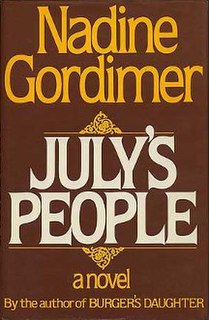
Nadine Gordimer was a South African writer, political activist and recipient of the 1991 Nobel Prize in Literature. She was recognized as a writer "who through her magnificent epic writing has – in the words of Alfred Nobel – been of very great benefit to humanity".
African Writers Series (AWS) is a series of books by African writers that has been published by Heinemann since 1962. The series has ensured an international voice to major African writers—including Chinua Achebe, Ngũgĩ wa Thiong'o, Steve Biko, Ama Ata Aidoo, Nadine Gordimer, Buchi Emecheta, and Okot p'Bitek. The emphasis is on Anglophone Africa, although a number of volumes were translated into English from French, Portuguese, Zulu, Swahili, Acholi, Sesotho, Afrikaans, Luganda and Arabic.

Burger's Daughter is a political and historical novel by the South African Nobel Prize in Literature-winner Nadine Gordimer, first published in the United Kingdom in June 1979 by Jonathan Cape. The book was expected to be banned in South Africa, and a month after publication in London the import and sale of the book in South Africa was prohibited by the Publications Control Board. Three months later, the Publications Appeal Board overturned the banning and the restrictions were lifted.

South African literature is the literature of South Africa, which has 11 national languages: Afrikaans, English, Zulu, Xhosa, Sotho, Pedi, Tswana, Venda, Swazi, Tsonga and Ndebele.
The social novel, also known as the social problemnovel, is a "work of fiction in which a prevailing social problem, such as gender, race, or class prejudice, is dramatized through its effect on the characters of a novel". More specific examples of social problems that are addressed in such works include poverty, conditions in factories and mines, the plight of child labor, violence against women, rising criminality, and epidemics because of over-crowding, and poor sanitation in cities.

July's People is a 1981 novel by the South African writer Nadine Gordimer. It is set in a near future version of South Africa where Apartheid is ended through a civil war. Gordimer wrote the book before the end of apartheid as her prediction of how it would end. The book was banned in South Africa after its publication, and later under the post-Apartheid government.

Jillian Becker is a novelist, prize-winning story-writer, critic, journalist and lecturer, best known internationally as a writer, researcher, and authority on the subject of terrorism and a prominent atheist.
Miriam Tlali was a South African novelist. She was the first black woman in South Africa to publish an English-language novel, Between Two Worlds, in 1975. She was also one of the first to write about Soweto. Most of her writing was originally banned by the South African apartheid regime.
Fiction in the 1970s brought a return of old-fashioned storytelling, especially with Erich Segal's Love Story. The early seventies also saw the decline of previously well-respected writers, such as Saul Bellow and Peter De Vries, both of whom released poorly received novels at the start of the decade, but rebounded critically as the decade wore on. Racism remained a key literary subject. John Updike emerged as a major literary figure with his 1971 novel Rabbit Redux. Reflections of the 1960s experience also found roots in the literature of the decade through the works of Joyce Carol Oates and Wright Morris. With the rising cost of hardcover books and the increasing readership of "genre fiction", the paperback became a popular medium. Criminal non-fiction also became a popular topic. Irreverence and satire, typified in Kurt Vonnegut's Breakfast of Champions, were common literary elements. The horror genre also emerged, and by the late seventies Stephen King had become one of the most popular novelists in America, a coveted position he maintained in the following decade.

Ronald Suresh Roberts, also known as RSR, is a British West Indian biographer, lawyer and writer. He is best known for his biographies of some of the leading figures in the "New South Africa" such as Nobel Prize winner Nadine Gordimer and former South African President Thabo Mbeki. Roberts has been described by Nelson Mandela as "a remarkable and dynamic young man". He currently lives in London, England.
Book censorship was carried out in Ireland from 1929 until 2010 when all prior bans expired. However, the laws remained on the statute books and a book was banned again in 2016. Censorship was enacted by a 1929 act of the Irish Free State.
The South African Literary Awards (SALA) were founded in 2005 to "pay tribute to South African writers who have distinguished themselves as ground-breaking producers and creators of literature", celebrating literary excellence "in the depiction and sharing of South Africa’s histories, value systems, philosophies and art as inscribed and preserved in all the South African official languages". The Awards honour living literary practitioners, as well as posthumous figures.

The Lying Days is the debut novel of Nobel winning South African novelist, Nadine Gordimer. It was published in 1953 in London by Victor Gollancz and New York by Simon & Schuster. It is Gordimer's third published book, following two collections of short stories, Face to Face (1949), and The Soft Voice of the Serpent (1952). The novel is semi-autobiographical, with the main character coming from a small mining town in Africa similar to Gordimer's own childhood. The novel is also a bildungsroman "about waking up from the naivete of a small colonial town."

Occasion for Loving is a 1963 novel by Nobel prize-winning South African author Nadine Gordimer. It was her third published novel, and sixth published book.

The Late Bourgeois World is a 1966 novella by Nadine Gordimer. The novel follows an egocentric White South African woman, as she negotiates a failing marriage, "half-hearted' love affairs and political intrigue. The novel was banned by the Censorship board in South Africa.

A World of Strangers is a 1958 novel by South African novelist and Nobel Laureate Nadine Gordimer. The novel included mixed reviews, drawing criticism for its pedantic explanation of Gordimer's worldview. The novel was banned in South Africa for 12 years.
None to Accompany Me is a 1994 novel by South African Nobel Winner Nadine Gordimer. The novel follows the motifs and plot framework of a Bildungsroman, exploring the development of the main character, Vera Stark. The novel is set during the early 1990s in South Africa after the release of Nelson Mandela.
New Africa Books is a South African book publisher based in Cape Town. The company incorporates David Philip Publishers, one of South Africa's oldest and most influential independent publishers. New Africa Books currently publishes literary and educational books for adults, children and young adults. It is one of the very few publishing imprints in South Africa to publish books in all 11 official South African languages.










